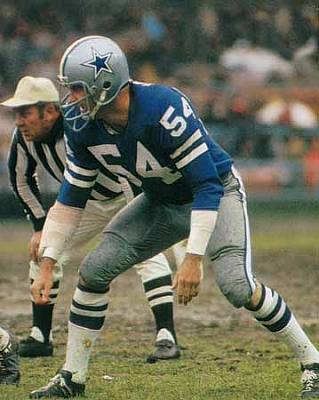Dallas LB Chuck Howley
Super Bowl V may have been the strangest of all of the 44 NFL title games played since the Super Bowl began. It was played following the 1970 season, the first year the NFL and AFL merged into one league with 2 conferences, after Cleveland, Pittsburgh and Baltimore were transferred from the old NFL into the American Conference of the new NFL. After the AFL had established itself as the NFL’s equal with 2 consecutive stunning Super Bowl wins, by the Jets and Chiefs, suddenly the game wound up with 2 old NFL teams playing each other, which took some of the competitiveness out of the game which existed when the young AFL was trying to make a name for itself in earlier years. Both teams entered this game with issues – the Cowboys had gained a reputation for being a good team that “couldn’t win the big one” after failing in the playoffs every year since the early ’60s. The Colts returned to the game where they had suffered the “embarrassment” of being upset by the upstart AFL Jets 2 years earlier, only this time were representing that upstart league as AFC champions. Nonetheless, both teams entered the contest needing to win badly to erase a losing stigma, despite being successful, winning franchises.
The game was an artistic mess, and it looked as if neither team was going to be able to erase that losing stigma, or if either was even capable. The game, which became known as the “Blunder Bowl”, featured 11 combined turnovers, including 7 by the winning team (a record that still stands today), 14 total penalties and a boatload of punts. The Cowboys finished with 113 passing yards, the Colts had 69 yards rushing. All 3 quarterbacks who played in the game, John Unitas and Earl Morrall for Baltimore and Craig Morton for Dallas, completed less than 50% of their pass attempts. A rookie kicker, Jim O’Brien, won the game by kicking a field goal with 5 seconds left, but only after Cowboy RB Dan Reeves let a pass slip through his hands that LB Mike Curtis intercepted, to set it up. Baltimore’s Don McCafferty became the first rookie head coach to win a Super Bowl, but obviously his coaching genius wasn’t much of a factor in the win. For the first and only time in Super Bowl history, a player from the losing team – linebacker Chuck Howley of the Cowboys (pictured above) – was named the game’s MVP. Howley refused to accept the award, saying it was meaningless to him after his team lost. So the Colts, ultimately, erased the stigma of being embarrassed by the Jets in Super Bowl III, but, instead of winning back the glory for the old guard NFL, their win gave the upstart AFL, now the AFC, a 3-2 lead in title games between the leagues. The Cowboys’ story finally got a happy ending also, as they returned to the Super Bowl the next season and soundly defeated Don Shula’s young up-and-coming Miami Dolphin squad in Super Bowl VI to finally give Tom Landry his long-awaited championship. One thing this game accomplished – it firmly established the fact that the old battleground days of the NFL and AFL were over, and that the NFL was now just one big happy family. From this point, the game grew immensely in the 1970s and beyond into the monster it is today.
